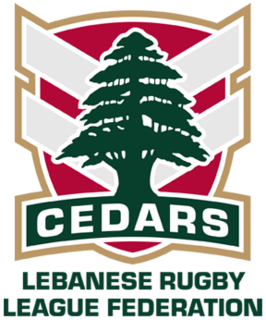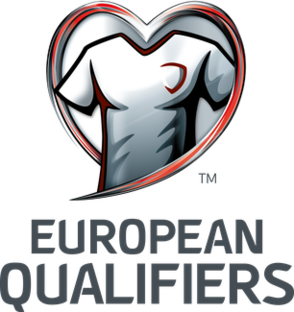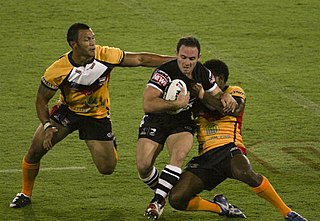
The Lebanon national rugby league team is the representative side of Lebanon in rugby league football. It is the top tier team of the Lebanese Rugby League Federation. They are nicknamed "The Cedars" after the Lebanon Cedar tree, which is also on the Lebanese flag. The team has been participating in international competition since 1998. The team was originally formed in New South Wales, Australia, composed of Lebanese Australians. But their success has helped the game grow in Lebanon and now players are also taken from the newly formed Lebanon Championship as well as the National Rugby League in Australia.

The Serbia national rugby league team represents Serbia in the sport of rugby league football and has been participating in international competition since 2003. Serbian Rugby League was reborn on November 10, 2001 after 40 years of non existence due to the Yugoslav Communist dictatorship banning the game in the mid 1960s because they favored Rugby Union which Croatia was playing at the time. Rugby League was first played in Serbia in 1953.
The FIFA World Cup qualification is the process that a national association football team goes through to qualify for the FIFA World Cup finals. The FIFA World Cup is the largest international team sport competition in the world with a qualification process required to reduce the large field of countries from 211 to just 32 for the World Cup finals.

The Russia national rugby union team, nicknamed the Bears, is administered by the Rugby Union of Russia (RUR). The RUR is considered the official successor union of the Soviet Union by World Rugby and the combined CIS team which played in the early 1990s. Since 1992, the team has played as Russia. Its first test match as Russia was against the Barbarians in Moscow in June 1992 and the country's first test against an official Test nation was against Belgium later that same year.
2008 Rugby League World Cup qualifying matches took place from April 2006 to November 2007. Of the ten teams to compete in the 2008 Rugby League World Cup, five of them qualified based on their performance in these matches. The other five teams had qualified automatically.
The 2014–15 European Rugby Challenge Cup was the first season of the European Rugby Challenge Cup, the annual rugby union competition. It is the 19th season of second tier pan-European club competition in general, as the competition replaces the European Challenge Cup. The competition began with the first round of the group stage, on the weekend of 16 October 2014, and ended with the final on 1 May 2015 at the Twickenham Stoop.

The European section of the 2018 FIFA World Cup qualification acted as qualifiers for the 2018 FIFA World Cup, which is being held in Russia, for national teams which are members of the Union of European Football Associations (UEFA). Apart from Russia, who qualified automatically as hosts, a total of 13 slots in the final tournament were available for UEFA teams.

The European Rugby Continental Shield is a rugby union competition, organised by European Professional Club Rugby, Rugby Europe and the Federazione Italiana Rugby, for entry into the European Rugby Challenge Cup.
The 2015–16 European Rugby Challenge Cup was the second edition of the European Rugby Challenge Cup, an annual pan-European rugby union competition for professional clubs. It is also the 20th season of the Challenge Cup competition in all forms, following on from the now defunct European Challenge Cup. Due to the 2015 Rugby World Cup taking place during September and October 2015, the competition began slightly later than usual, with the first round of the group stage, on the weekend of 12/13/14/15 November 2015, and ended with the final on 13 May 2016 in Lyon.
The 2016–17 European Rugby Champions Cup was the third European Rugby Champions Cup championship, the annual rugby union club competition for teams from the top six nations in European rugby. The competition replaced the Heineken Cup, which was Europe's top-tier competition for rugby clubs for the first nineteen years of professional European rugby union. The opening round of the tournament took place on the weekend of 14/15/16 October 2016. The final took place on 13 May 2017 at Murrayfield in Edinburgh.
The 2016–17 European Rugby Challenge Cup was the third edition of the European Rugby Challenge Cup, an annual second-tier rugby union competition for professional clubs. Clubs from six European nations plus one Russian club competed. It was also the 21st season of the Challenge Cup competition in all forms, following on from the now defunct European Challenge Cup.
The 2017–18 European Rugby Champions Cup was the fourth European Rugby Champions Cup championship, the annual rugby union club competition for teams from the top six nations in European rugby and was the twenty-third season of pan-European professional club rugby competition.
The 2017–18 European Rugby Champions Cup-Challenge Cup play-off was the third play-off for entry into the top level competition of European Club rugby union, the European Rugby Champions Cup.
The 2017–18 European Rugby Challenge Cup was the fourth edition of the European Rugby Challenge Cup, an annual second-tier rugby union competition for professional clubs. It was also the 22nd season of the Challenge Cup competition in all forms, following on from the now defunct European Challenge Cup. Clubs from six European nations plus two Russian club will competed for the title.
The 2021 Rugby League World Cup qualifying process began in June 2018 with the commencement of the 2018 Rugby League European Championship C tournament. Of the 16 nations that will compete in the World Cup, 8 were granted automatic qualification, having reached the quarter finals of the 2017 World Cup. The remaining 8 places will be decided a qualifying process.
The 2018–19 European Rugby Challenge Cup is the fifth edition of the European Rugby Challenge Cup, an annual second-tier rugby union competition for professional clubs. Including the predecessor competition, the original European Challenge Cup, this is the 23rd edition of European club rugby's second-tier competition. Clubs from five of the nations that participate in the Six Nations Championship, with Scotland as the only exception, plus Romania and Russia are competing.











